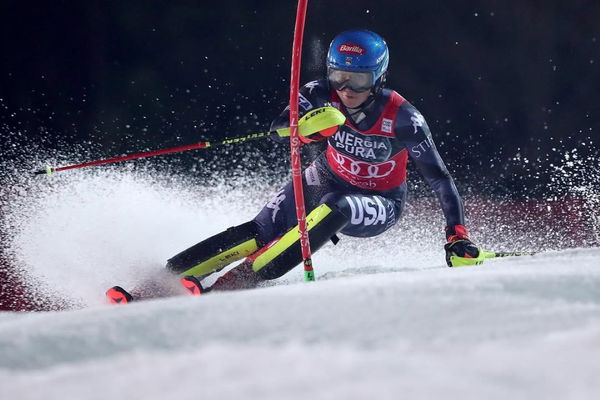

“It’s just challenging to be a ski racing fan in the U.S.,” said Mikaela Shiffrin ahead of the FIS World Cup’s North American leg. Shiffrin is well aware that decentralized broadcasting rights for skiing are hurting its growth in the States. It’s hard to access the TV. Praising the passionate American fan base, Shiffrin told Olympics.com who sacrifice sleep just to catch a broadcast.
“It’s hard to watch it when it’s not prime-time in the U.S. It’s literally waking up in the middle of the night to watch the run,” the five-time overall World Cup winner told Olympics.com. However, after Shiffrin’s call to promote skiing in the “untapped” U.S. market, a fellow American and alpine skier is taking action. In fact, the wheel is already in motion.
ADVERTISEMENT
Article continues below this ad
Bryce Bennett hopes to use a popular format to attract more fans
After Shiffrin said that there was “an enormous opportunity for ski racing to grow,” 32-year-old Olympian Bryce Bennett is acting on it. Bennett, who has been part of the same Olympic team as Shiffrin twice, hopes to use the podcast format to spread the word about skiing. Bennett hopes to take advantage of the growing format to reach the widest audience.
Poll of the day
Poll 1 of 5
Is Bryce Bennett's podcast the key to making skiing popular in the U.S.?
Yes, it's a great idea
No, it won't make a difference
Maybe, if done right
Skiing will never be popular here
Was Jimmie Johnson's 2012 Southern 500 win the most significant victory in Hendrick Motorsports' history?
Yes, it ended a crucial winless streak
No, there are bigger wins
It's one of the top moments
Not sure
Want to dive deeper?
Here are the articles that inspired recent polls.
Do you think Max Verstappen's family announcement will impact his future in Formula 1?
Yes, he'll focus more on family
No, he'll stay committed to racing
It might change his priorities
Not sure
Do you believe D.J. Reader's emphasis on family values and community service will shape his son's future more than his NFL career?
Yes, values are more important
No, NFL legacy is key
Both are equally important
Not sure
Do you agree with Amik Robertson's bold claim that the Packers are "pretenders"?
Absolutely, the Lions are the real deal
No way, the Packers are still contenders
It's just trash talk
Not sure
Want to dive deeper?
Here are the articles that inspired recent polls.
AD
“We want to help people understand the intricacies of the sport… So they have a deeper understanding and appreciation for what’s going on in a racer’s mind.” Bryce Bennett told Olympics.com. Leveraging the format’s growth to bring in more fans could prove to be an ingenious move, especially because: “We’re going to try and give people an inside scoop,” said Bennett.

Listening to world-class athletes discuss the sport will give avid fans and newcomers a fresh perspective. “It’s like Formula One… If you just turn on an F1 race, you’re like, ‘I have no idea what’s going on.’ But you spend some time learning, maybe listen to a couple podcasts and watch the races. That can turn into, ‘I’m into this.'” added Mikaela Shiffrin’s former teammate.
What’s your perspective on:
Is decentralized broadcasting killing the passion for ski racing in the U.S.?
Have an interesting take?
With everything planned out, Bryce Bennett’s Downhiller No Filter will debut with its first episode later in December. Mikaela Shiffrin‘s Olympics teammate didn’t mention the exact release date. With that being said, skiing fans in the States have already suffered a huge blow this year.
Not the homecoming Mikaela Shiffrin expected
Despite the broadcast situation being far from ideal, American skiing fans were stoked to hopefully witness Shiffrin make history on home snow. The Burke Academy alumni’s return to Vermont turned into a disaster. As Shiffrin slipped and chased into the protective fence, her dreams of winning her 100th World Cup race at home also crashed. And now, the 29-year-old doesn’t know when she’ll get back to the slopes.
The alpine skiing legend is “starting to feel a little bit more human,” nearly a week removed from the brutal fall. However, she won’t be able to join the next FIS World Cup event at Beaver Creek either. “This is another fairly ambiguous injury and really hard to put a timeline of when I’ll be either back on snow or back to racing,” Mikaela Shiffrin revealed.
ADVERTISEMENT
Article continues below this ad

ADVERTISEMENT
Article continues below this ad
While Shiffrin doesn’t have broken bones or torn ligaments, she is currently recovering from the muscle trauma. “Whatever stabbed there did a little dancy-dance, and basically tore a cavern into my oblique muscles,” explained the Olympian. It was during this very update that the five-time overall champion confirmed she would not compete at Birds of Prey.
Skiing fans will also miss that chance to see Bennett and Shiffrin in action on the same weekend. While Shiffrin has pulled out, Bennet is excited to return to competitive racing after staying away from racing for two years. So it seems Bryce Bennett is looking forward to a lot more than just promoting alpine skiing.
Have something to say?
Let the world know your perspective.
ADVERTISEMENT
ADVERTISEMENT
ADVERTISEMENT
ADVERTISEMENT



Debate
Is decentralized broadcasting killing the passion for ski racing in the U.S.?